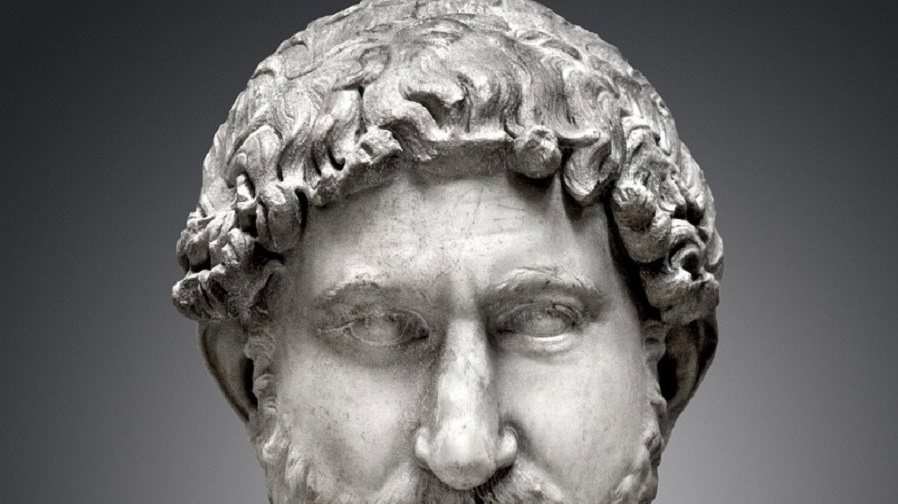Hadrian was Roman emperor from 117 to 138. He was born Publius Aelius Hadrianus, probably at Italica, near Santiponce, into a Hispano-Roman family. His father was of senatorial rank, and was a first cousin of the emperor Trajan. Take a look below for 30 more awesome and interesting facts about Hadrian.
1. Early in Hadrian’s career, before Trajan became emperor, he married Trajan’s grand-niece Vibia Sabina, possibly at the behest of Trajan’s wife, Pompeia Plotina.
2. Plotina and Trajan’s close friend and adviser Licinius Sura, were well disposed towards Hadrian.
3. When Trajan died, his widow claimed that immediately before his death, he had nominated Hadrian as emperor.
4. Rome’s military and Senate approved Hadrian’s succession, but soon after, four leading senators who had opposed Hadrian, or seemed to threaten his succession, were unlawfully put to death. The senate held Hadrian responsible for this, and never forgave him.
5. He earned further disapproval among the elite by abandoning Trajan’s expansionist policies and recent territorial gains in Mesopotamia, Assyria and Armenia, and parts of Dacia.
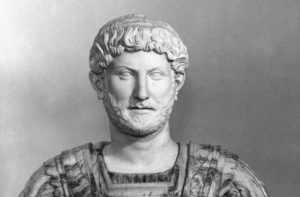
6. Hadrian preferred to invest in the development of stable, defensible borders, and the unification, under his overall leadership, of the empire’s disparate peoples.
7. He’s known for building Hadrian’s Wall, which marked the northern limit of Britannia.
8. Hadrian energetically pursued his own Imperial ideals and personal interests.
9. He visited almost every province of the Empire, accompanied by a probably vast Imperial retinue of specialists and administrators.
10. He encouraged military preparedness and discipline, and fostered, designed or personally subsidized various civil and religious institutions and building projects.
11. In Rome itself, he rebuilt or completed the Pantheon, and constructed the vast Temples of Venus and Roma.
12. In Egypt, he may have rebuilt the Serapeum of Alexandria.
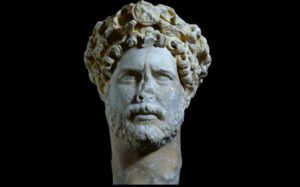
13. An ardent admirer of Greece, he sought to make Athens the cultural capital of the Empire and ordered the construction of many opulent temples there.
14. His intense relationship with the Greek youth Antinous, and the latter’s untimely death, led to Hadrian’s establishment of an enduring and widespread popular cult.
15. Late in his reign, he suppressed the Bar Kokhba revolt in Judaea. Apart from that, Hadrian’s reign was generally peaceful.
16. Hadrian’s last years were wrought with chronic illness.
17. He saw the Bar Kokhba revolt as the failure of his panhellenic ideal.
18. His execution of two more senators for their alleged plots against him provoked further resentment.
19. His marriage to Vibia Sabina had been unhappy, and childless. In 138, he adopted Antoninus Pius and nominated him as a successor, on the condition that Antoninus adopt Marcus Aurelius and Lucius Verus as his own heirs.
20. In 138, Hadrian died and Antoninus had him deified, despite opposition from the Senate.
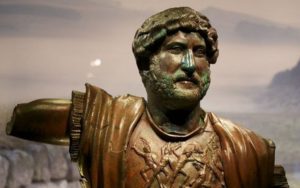
21. He has been described as enigmatic and contradictory, with a capacity for both great personal generosity and extreme cruelty, and driven by insatiable curiosity, self-conceit, and above all, ambition.
22. Hadrian was the first Roman Emperor to make it known publicly that he was gay.
23. His companion, Antinous, accompanied him on all his travels and finds mention in Hadrian’s poetry.
24. Hadrian even named a Greek city after Antinous when he died a premature death due to drowning.
25. Hadrian had an interest in astrology and divination and had been told of his accession to the throne by his grand uncle.
26. When Hadrian fell out with Emperor Trajan, he tried to make amends with the Emperor by indulging in heavy drinking with him.
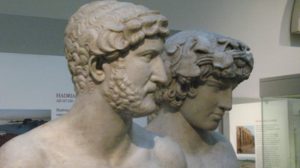
27. He was a great hunter and brought the beard back into fashion in Rome.
28. He is responsible for laying the foundation of the Byzantine Empire and changed the name of Judea to create Palestine.
29. Hadrian wrote poetry and his biography titled “Phlegon of Tralles.”
30. In his reign from 117 to 138, Hadrian earned the reputation of being a good administrator and a humanist. He brought in legal reforms to define the law and not leave it to the interpretation of senators.

